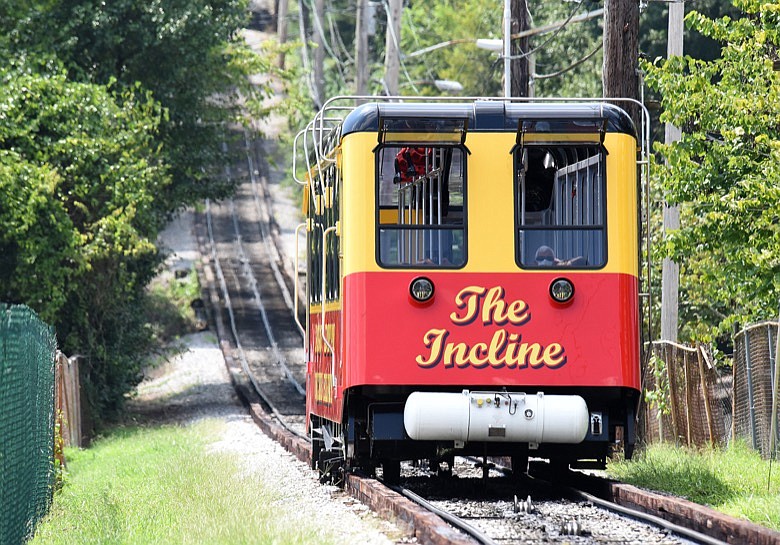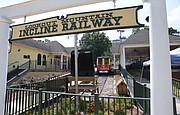Triple-digit temperatures inside the tram cars of the Lookout Mountain Incline Railway have employees raising concerns about unsafe working conditions and poor customer experiences.
Workers allege the cars, installed last year, were supposed to have air conditioning, but Chattanooga Area Regional Transportation Authority leadership says that was never the case.
On Wednesday afternoon, with an outdoor temperature of around 94 degrees, the cabin of an idle railway car at the bottom of Lookout Mountain read 101 degrees despite interior fans and open windows.
Chris Crowe, vice president of Amalgamated Transit Union Local 1212 and an operator on the incline, said the heat is making the railway unsafe for employees who are working 10-hour shifts. The sun can heat up the cars through the glass roof or the numerous windows on the car.
Uncomfortably hot tram cars also are likely to make for bad experiences for tourists on the railway, founded in 1895 and featured on most lists of Chattanooga's top attractions. The railway bills itself as Chattanooga's oldest continually operated tourist attraction and is on the National Register of Historic Places. It's known as "America's most amazing mile."
Customers get upset about the heat during the 10-minute ride and some have appeared to suffer from heat-related issues, Crowe said. So far, no CARTA employees that he knows about have suffered issues from the heat, such as heat exhaustion or heat stroke.
Crowe said workers had an understanding the new cars would be air-conditioned when CARTA installed the specially designed cars in March 2020. The project cost around $4 million. News coverage of the arrival of the new cars stated the new designs would include A/C.
However, Lisa Maragnano, executive director of CARTA, said the claim is not true because air conditioning units would be too heavy to still meet the weight limits required for the vehicles to make it up the mountainside, which at one point reaches a nearly 73% grade.
"The cars do not have A/C," Maragnano said. "They were never designed to have A/C because there's not enough battery power that you could put on there that won't affect the weight of the cars."
The Incline Railway's website states the cars are not air-conditioned.
Maragnano said CARTA is working with the manufacturer, the Pennsylvania-based Brookville Equipment Corp., to make improvements. The organization is exploring other modifications to the station to provide more shade, she said.
"We're going to continue to look at ways to get the air flowing better within the cars," Maragnano said.
CARTA has installed small fans in the cabin and opened windows, as well as placed large fans at the station.
"That hasn't helped," Crowe said. "All it's doing is moving air around, hot air around. You do have a little bit more airflow because of it but the other problem is with COVID now you're blowing germs around. It's just a bad work situation and a bad work environment with the extreme heat and the fans blowing more germs around, really."
Lakecha Strickland, president of ATU Local 1212, said CARTA is not addressing the needs of its workers despite requests to improve the working conditions at the incline railway.
"It just seems like it's falling on deaf ears again," Strickland said. "They want to say that we're putting up a fight but all we want to do is be treated fairly and have a safe working place. It seems like every issue we bring about there's never a resolution."
CARTA workers still are seeking to have hazard pay returned to those on the front line. Between 25% and 28% of employees have been affected by COVID-19, either getting sick or having to miss work to quarantine, Strickland said. CARTA ended the extra hazard pay in January.
The spread of the delta variant has caused local case numbers and hospitalizations to spike in the past month, with some of the highest figures since the winter surge.
Strickland said the union's contract with CARTA expired at the end of June and the union remains in contract negotiations for increased hourly pay, more sick time, better vacation benefits and combining the classification of drivers.
The transit organization has struggled with staffing levels and hiring, Strickland said, because new workers do not have consistent shift schedules.
"There's simply no structure there. And when people come into a workplace that's not structured, they just walk right back out the door," Strickland said.
The union would like to see classifications for drivers combined so, for example, a shuttle driver could fill in for a fixed route bus driver if needed. The current classification structure does not allow for that, she said.
CARTA and the union will enter contract mediation on Aug. 30 and 31. If no resolution is reached, the two groups will enter a fact-finding phase as outside counselors review the situation.
Contact Wyatt Massey at wmassey@timesfreepress.com.

